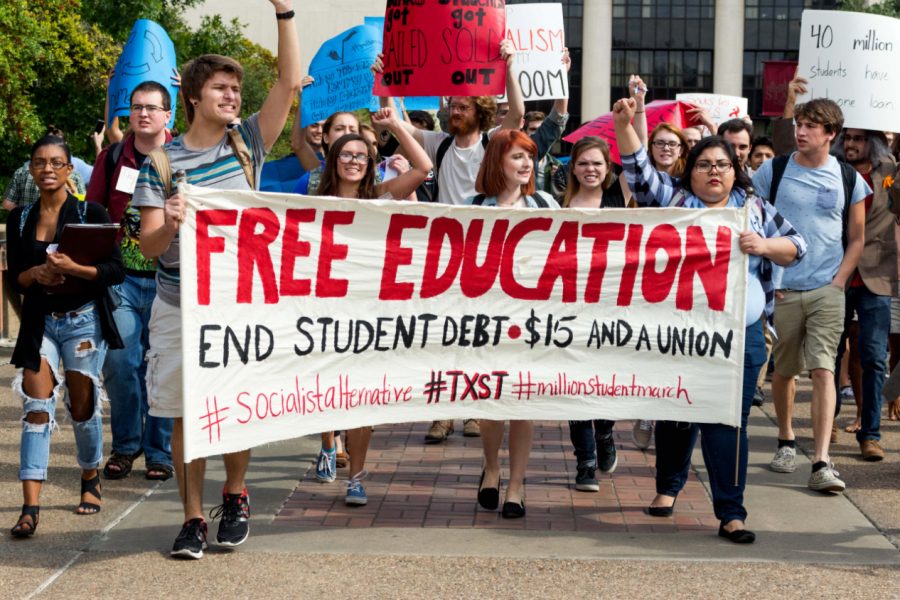Gov’t Funded College (Pro): Education is the Future of the Republic
Free public university is an expensive proposition. Yet despite the high price, there are two primary reasons why tertiary education should be free to any qualified high school graduate. One is certainly utopian, an expression of our American ethos of opportunity, equality, and innovation. The second is that a better educated workforce will be able to remain competitive in the global marketplace and consequently generate enough tax revenue to repay the expenses of its training.
Education is critical to the health of the United States. Our founders were adamant that their experiment could survive politically and economically only if it properly educated its citizens in civic virtue and productive trades. John Jay, the first Chief Justice of the Supreme Court, saw education as the “soul of a republic” and wrote that “nothing should be left undone to afford all ranks of people the means of obtaining a proper degree of it at a cheap and easy rate.” Education is the great leveler. If we believe in equality between individuals and the importance of active participation in democracy, then we must make all resources available for Americans to develop themselves. The country recognized this around the end of the nineteenth century with the mass institutionalization of compulsory education, first through grammar school and eventually through age eighteen. Government-provided education was solidified even further by new federal funding under the Elementary and Secondary Education Act of 1965, whose purpose was “to provide all children significant opportunity to receive a fair, equitable, and high-quality education, and to close educational achievement gaps.” While our stated ideals have not changed, the world around them has. Jay’s “proper degree” of education, for nearly all professions, is now at least a college degree. If we believe in equality of opportunity, everyone who is intellectually able to take advantage of a university education must be allowed to do so. The original purpose of state universities was to improve educational access, but with state support dwindling and tuition climbing, it is time to renew our commitment on the state and federal levels.
Education is the great leveler. If we believe in equality between individuals and the importance of active participation in democracy, then we must make all resources available for Americans to develop themselves.
The world around us changes rapidly, and in no area more so than the technology that drives our economy. The era of telecommunications and information technology is a far cry from the enterprises of the republic’s early days, but the importance of maintaining a labor force at the cutting edge has not diminished. The greatest historical periods of economic expansion have been when Americans were able to take advantage of new waves of innovation, and this is only possible when large portions of the populace are college educated. Consider the 1950s. Sustained, real growth of nearly 10% annually generated an era of immense prosperity at least partly due to the education level of the workforce during that period. Thanks to the GI Bill’s benefits to veterans, millions of young Americans returned from World War II able to take advantage of new opportunities offered to them by a grateful nation. First among these was free college, spawning a generation of engineers, financiers, and researchers able to make the most of the return to a civilian economy. Fiscal success by graduates generated enough taxable revenue to return the government’s investment, as it would still likely today by a surplus of 7-10%, according to the Rand Corporation, a think tank. As the trend toward information economy and post-industrialism continues, it is critical to the United States’s prospects to educate our population at the highest level, especially as other nations, primarily in Europe and East Asia, do the same. We cannot allow a lack of will and a fear of raising taxes to hobble our hopes for future development.
Thus despite the significant expense university education poses, it is necessary to protect the American ideal of equal opportunity and to ensure our continued competitiveness in the face of global economic challenges. With the exorbitant price of college out of many hard-working Americans’ reach, it falls upon the government to provide access to it.
Whom do you agree with on the topic of public universities being tuition free?
- Jack Covert (70%, 16 Votes)
- Ben Feinstein (30%, 7 Votes)
Total Voters: 23

Jack Covert is a senior who has attended Keystone since ninth grade. Jack is involved in Model UN, Academic WorldQuest, LitMag, NHS, and theater. Next...


